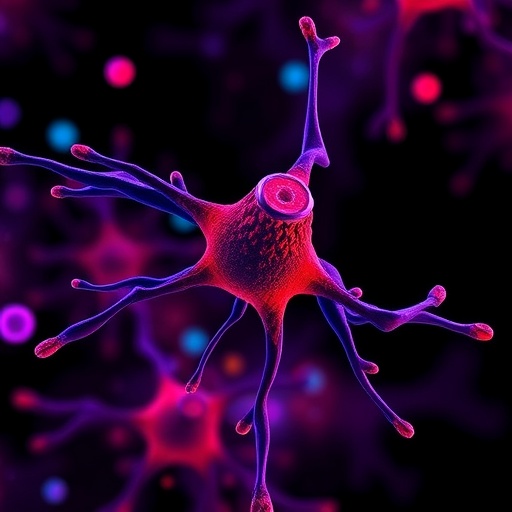
In a groundbreaking advancement that promises to reshape the landscape of cancer immunotherapy, researchers have unveiled a novel interplay between mast cells and mucosal-associated invariant T (MAIT) cells, revealing the pivotal role of inflammasome-dependent IL-18 secretion in amplifying the anti-tumor immune response. This discovery, detailed in the prestigious journal Nature Communications, elucidates a previously underappreciated mechanism by which innate and adaptive immune cells collaborate to enhance tumor eradication, opening new avenues for therapeutic intervention.
At the core of this study lies the intricate crosstalk between two distinctive immune cell populations: mast cells, traditionally recognized for their involvement in allergic reactions and inflammation, and MAIT cells, a specialized subset of T lymphocytes known for their rapid response to microbial metabolites presented by the MR1 molecule. The interplay between these cell types, orchestrated through the inflammasome complex and the release of interleukin-18 (IL-18), sparks a potent immunological cascade capable of mounting a formidable defense against malignant cells.
Mast cells, residing ubiquitously in tissues including the tumor microenvironment, serve as sentinels that detect danger signals. The study reveals that upon interaction with tumor cells or their associated danger-associated molecular patterns (DAMPs), mast cells activate the inflammasome—a multiprotein signaling platform responsible for the maturation and secretion of pro-inflammatory cytokines such as IL-18. This inflammasome activation specifically hinges on the assembly of complexes involving NLRP3, ASC, and caspase-1, which cleave pro-IL-18 into its active form.
.adsslot_jONGltDuEM{width:728px !important;height:90px !important;}
@media(max-width:1199px){ .adsslot_jONGltDuEM{width:468px !important;height:60px !important;}
}
@media(max-width:767px){ .adsslot_jONGltDuEM{width:320px !important;height:50px !important;}
}
ADVERTISEMENT
The secretion of IL-18 emerges as the crucial molecular bridge linking mast cell activity to the functional modulation of MAIT cells. IL-18, a cytokine traditionally implicated in the activation of natural killer (NK) cells and T helper 1 (Th1) responses, is shown here to dramatically enhance the effector functions of MAIT cells within the tumor milieu. Increased IL-18 levels potentiate the cytotoxic arsenal of MAIT cells, including the upregulation of perforin, granzyme B, and pro-inflammatory cytokines such as interferon-gamma (IFN-γ), thereby amplifying their capacity to target and eliminate tumor cells.
The researchers employed sophisticated in vitro co-culture systems and in vivo tumor models to dissect the cellular and molecular dynamics of this immune partnership. They demonstrated that blockage of inflammasome components or neutralization of IL-18 markedly diminishes the anti-tumor efficacy of MAIT cells, underscoring the non-redundant role of mast cell-derived IL-18 in this process. Furthermore, genetic ablation of inflammasome elements yielded tumor progression acceleration, cementing the protective axis established by mast cells and MAIT cells.
One of the most striking findings of this study is the ability of mast cells to reprogram the tumor microenvironment from a passive to an actively hostile niche toward cancer cells. By delivering inflammasome-triggered IL-18, mast cells invigorate MAIT cells to overcome the immunosuppressive hurdles commonly imposed by tumors. This immune activation axis propels a shift from an immunologically “cold” tumor microenvironment—characterized by low immune infiltration and activity—to a “hot” one, rich in effector T cell functionality and cytokine production, which is essential for successful immunotherapy outcomes.
The authors also highlight the broader implications of their findings in the context of current cancer treatment modalities. Immunotherapies, including checkpoint inhibitors and adoptive T cell transfer, often face limitations due to tumor-induced immune evasion and exhaustion of effector cells. The newly uncovered mast cell-MAIT cell collaboration represents a potential strategy to revitalize exhausted T cells or augment innate immune surveillance mechanisms, possibly synergizing with existing therapies to produce more durable responses.
From a mechanistic standpoint, the elucidation of inflammasome-dependent IL-18 secretion as a modulatory checkpoint in tumor immunity enriches our understanding of the complex immunological networks at play. It reframes mast cells not merely as bystanders or contributors to inflammation but as active architects of immune escalation against tumors, guided by inflammasome machineries traditionally linked to infectious diseases and sterile injury responses.
The temporal dynamics of this immune orchestration are equally critical. Mast cell activation and IL-18 release precede and sustain MAIT cell effector responses, suggesting a domino effect that could be therapeutically harnessed by designing agents capable of selectively enhancing inflammasome activation in mast cells within tumors. Pharmacological targeting of the inflammasome-IL-18 axis may thus unlock a new class of adjuvant treatments aimed at intensifying innate-adaptive immune cooperation.
Importantly, the study underscores the need to revisit the role of IL-18 in cancer immunology. While IL-18’s function has been historically ambiguous due to its context-dependent pro- and anti-inflammatory effects, this research delineates a clear anti-tumor dimension mediated by MAIT cells, advocating for a more nuanced application of IL-18-modulating therapies, possibly in combination with cellular immunotherapies that engage MAIT cells directly.
Technological advances in single-cell RNA sequencing and multiplex immunohistochemistry allowed the researchers to map cellular interactions and cytokine profiles with unprecedented resolution. This enabled the identification of phenotypic signatures of activated mast cells and MAIT cells within various tumor types, reinforcing the universality of this mechanism across cancer subtypes and paving the way for biomarker development to stratify patients most likely to benefit from interventions targeting this axis.
The translational potential of these findings cannot be overstated. The researchers propose future clinical investigations focusing on agents that can modulate inflammasome components or enhance IL-18 availability, alongside MAIT cell expansion protocols, to establish a combinatorial treatment paradigm. Such integrated approaches might overcome resistance mechanisms and improve patient prognoses, especially in cancers that remain refractory to current immunotherapies.
Furthermore, the study raises intriguing questions regarding the plasticity of mast cells and MAIT cells in different tumor contexts, hinting that microenvironmental factors might fine-tune their functional states. Understanding these nuances could facilitate the design of precision immunotherapies that harness this cellular crosstalk more effectively, tailoring interventions to the unique immunological landscape of each patient’s tumor.
In conclusion, the discovery of mast cells enhancing the anti-tumor efficacy of MAIT cells through inflammasome-dependent IL-18 secretion marks a paradigm shift in cancer immunology. It uncovers a dynamic and targetable immune interplay that merges innate sensing with adaptive execution, unlocking new therapeutic vistas. As cancer continues to challenge global health, insights like these illuminate paths toward more powerful, precise, and durable immune-based treatments.
Subject of Research:
Immune cell interactions in tumor microenvironments, specifically the role of mast cells and MAIT cells mediated by inflammasome-dependent IL-18 secretion in enhancing anti-tumor immunity.
Article Title:
Mast cells boost anti-tumor potency of MAIT cells via inflammasome-dependent secretion of IL-18.
Article References:
Fan, F., Wang, J., Liu, K. et al. Mast cells boost anti-tumor potency of MAIT cells via inflammasome-dependent secretion of IL-18. Nat Commun 16, 6074 (2025). https://doi.org/10.1038/s41467-025-61324-w
Image Credits: AI Generated
Tags: anti-tumor immunological cascadecancer immunotherapy advancementsdanger signals in tumor cellsimmune cell populations in cancerinflammasome-dependent IL-18 secretioninnate and adaptive immune collaborationinterleukin-18 in cancer treatmentmast cells and MAIT cells interactionmast cells role in tumor microenvironmentmucosal-associated invariant T cellstherapeutic interventions in cancertumor-fighting immune response



